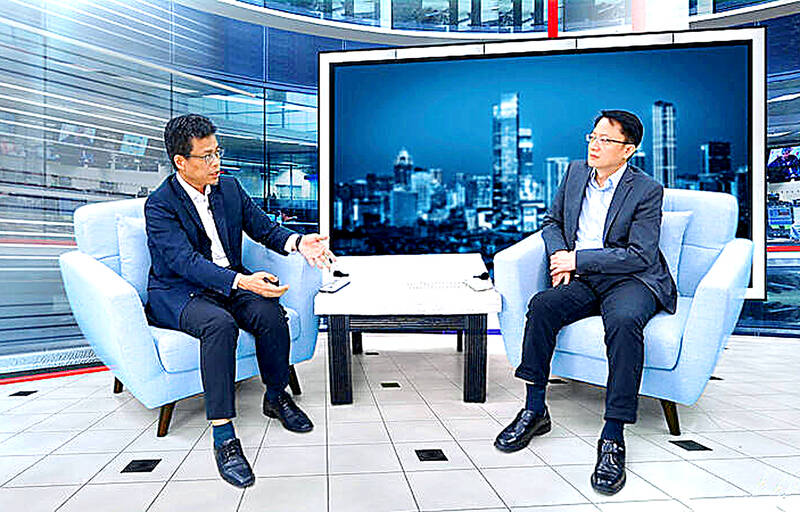China’s vehement reaction to Taiwan’s indigenous submarine program shows Beijing is concerned about the effect the program would have on the projection of Chinese power, Presidential Office Deputy Secretary-General Alex Huang (黃重諺) told the Chinese language Liberty Times (the Taipei Times’ sister newspaper) in an exclusive interview published yesterday.
Such was the importance of the program that the group who was presiding over it — including program head Huang Shu-kuang (黃曙光) and CSBC Corp, Taiwan chairman (台船) Chen Wen-lon (鄭文隆) — had a difficult few years and could barely get a good night’s sleep, Huang said.
Engineers and designers in the navy’s research and development division passed on promotion opportunities to keep working on the program, he added.

Photo: Chen Yi-ling, Taipei Times
There is a limited number of countries or companies that are capable of building submarines, he said, adding that it was evident that “the Chinese had intervened” once potential partners for the program were announced by Taiwanese media.
Taiwanese public support for the program has reached a record high, and the program’s managers would cautiously approach the subsequent phases of combat trials to prove that they could produce submarines with above-average combat capabilities, Alex Huang said.
The launch ceremony on Sept. 28 saw attendance of officials across party lines, highlighting bipartisan support for the project, he said.
Citing Vice President William Lai’s (賴清德) comments on the Chinese Nationalist Party’s (KMT) move to block the acquisition of eight diesel-electric submarines from the US 18 years ago, Alex Huang said he had found it unreasonable that Taiwanese pushed against efforts to better protect themselves.
He urged the opposition parties to collaborate with the ruling party to strengthen Taiwan’s military, adding that both sides needed more dialogue.
Commenting on the possibility of Chinese intervention in next year’s elections, Alex Huang said that China had used military exercises and direct threats to manipulate the 1995 legislative and 1996 presidential elections.
China is attempting to manipulate Taiwanese so that they believe their choice directly impacts whether there is war or peace across the Taiwan Strait, and in so doing, ensuring someone Beijing is more willing to accept is elected, he said.
The media has a responsibility to provide the government oversight, but when they allow themselves to be used by Beijing to create unnecessary confrontation, it is perhaps time for reflection, he added.
‘TRAITOR’
Separately, the KMT caucus called on Huang Shu-kuang to announce the identity of “the traitor,” referring to his claim on Sept. 28 that “certain legislators” were making it difficult for the program to purchase critical equipment.
His comments were quickly followed by allegations from retired navy captain Kuo Hsi (郭璽) later that day that Huang Shu-kuang was referring to KMT Legislator Ma Wen-chun (馬文君).
KMT Legislator Cheng Cheng-chien (鄭正鈐) yesterday said that all the parties wanted Taiwan to have greater national defense capabilities, but the budgeting and procedural reviews should be transparent to prevent embezzlement.
Cheng called on Huang Shu-kuang to clarify his statements, adding that it was immoral for a person in Huang Shu-kuang’s position to accuse opposition legislators of wrongdoing.
Additional reporting by CNA

An essay competition jointly organized by a local writing society and a publisher affiliated with the Chinese Communist Party (CCP) might have contravened the Act Governing Relations Between the People of the Taiwan Area and the Mainland Area (臺灣地區與大陸地區人民關係條例), the Mainland Affairs Council (MAC) said on Thursday. “In this case, the partner organization is clearly an agency under the CCP’s Fujian Provincial Committee,” MAC Deputy Minister and spokesperson Liang Wen-chieh (梁文傑) said at a news briefing in Taipei. “It also involves bringing Taiwanese students to China with all-expenses-paid arrangements to attend award ceremonies and camps,” Liang said. Those two “characteristics” are typically sufficient

A magnitude 5.9 earthquake that struck about 33km off the coast of Hualien City was the "main shock" in a series of quakes in the area, with aftershocks expected over the next three days, the Central Weather Administration (CWA) said yesterday. Prior to the magnitude 5.9 quake shaking most of Taiwan at 6:53pm yesterday, six other earthquakes stronger than a magnitude of 4, starting with a magnitude 5.5 quake at 6:09pm, occurred in the area. CWA Seismological Center Director Wu Chien-fu (吳健富) confirmed that the quakes were all part of the same series and that the magnitude 5.5 temblor was

The brilliant blue waters, thick foliage and bucolic atmosphere on this seemingly idyllic archipelago deep in the Pacific Ocean belie the key role it now plays in a titanic geopolitical struggle. Palau is again on the front line as China, and the US and its allies prepare their forces in an intensifying contest for control over the Asia-Pacific region. The democratic nation of just 17,000 people hosts US-controlled airstrips and soon-to-be-completed radar installations that the US military describes as “critical” to monitoring vast swathes of water and airspace. It is also a key piece of the second island chain, a string of

The Central Weather Administration has issued a heat alert for southeastern Taiwan, warning of temperatures as high as 36°C today, while alerting some coastal areas of strong winds later in the day. Kaohsiung’s Neimen District (內門) and Pingtung County’s Neipu Township (內埔) are under an orange heat alert, which warns of temperatures as high as 36°C for three consecutive days, the CWA said, citing southwest winds. The heat would also extend to Tainan’s Nansi (楠西) and Yujing (玉井) districts, as well as Pingtung’s Gaoshu (高樹), Yanpu (鹽埔) and Majia (瑪家) townships, it said, forecasting highs of up to 36°C in those areas